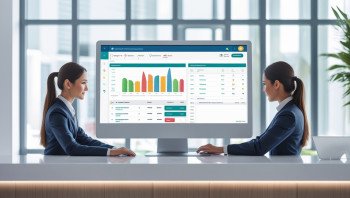A Hotel Booking and Staff
Management Website is a comprehensive digital platform designed to
streamline the operations of a hotel, catering to both the customers looking to
book rooms and the management team handling day-to-day staff operations. This
kind of website is an essential tool for modern hospitality businesses,
offering a range of features that improve efficiency, enhance customer service,
and simplify management tasks. Below is a detailed description of such a
website and the various functions it serves.
Introduction
The hospitality industry has
always been centered around providing excellent customer service. As technology
advances, hotels are increasingly relying on digital platforms to facilitate
operations and offer a better experience to their customers. A Hotel Booking
and Staff Management Website combines the two main pillars of hotel
operations: booking systems and staff management. It integrates
these features to ensure smooth and effective hotel management. These websites
can be tailored to meet the needs of small boutique hotels, large resorts, or
chain hotels, each having their specific set of requirements.
Key Features of the Hotel
Booking System
User-Friendly Interface: A
key aspect of the booking system is its user interface. It is essential that
potential customers can navigate the website easily, view available rooms, and
make bookings with minimal effort. This includes providing clear descriptions
of the rooms, the amenities available, and photographs to help guests make an
informed decision.
Room Availability and Booking
Engine: The website must have a real-time booking engine that allows
customers to check room availability for specific dates. Once a guest selects a
room and provides the necessary details, the system updates the availability
status and prevents overbooking. Features like price comparison, discounts,
and special offers can also be integrated to attract customers.
Payment Integration: A
secure payment gateway is crucial for any hotel booking website. Integrating
payment systems such as credit/debit card processing, PayPal, or other popular
payment methods ensures a seamless transaction process. The website should also
allow guests to pay in installments or make deposits if required.
Reservation Confirmation and
Notifications: After booking, guests receive a confirmation email or SMS
with all the details, including the reservation number, check-in/check-out
times, and payment status. This improves communication between the hotel and
the guest and reduces booking errors.
Customer Account and Profile
Management: The website should allow guests to create profiles where they
can manage their bookings, preferences, and payment information. It also allows
for future bookings to be streamlined by pre-filling details like personal
information and payment options. Personalized customer profiles can offer
tailored services, improving customer satisfaction and loyalty.
Multi-Channel Booking
Integration: The website can be integrated with third-party travel
agencies, online booking platforms, and global distribution systems (GDS) to
increase the visibility of the hotel and boost bookings. This reduces the risk
of under-booking by ensuring the hotel is listed across multiple platforms.
Cancellation and Refund
Management: Flexibility in cancellations is often crucial for attracting
customers. The system can be set up to allow guests to cancel or modify their
bookings, according to the hotel’s policies. Refund processes should be handled
efficiently, ensuring guests feel valued even if their plans change.
Key Features of the Staff
Management System
Employee Profiles: A staff
management system allows the creation and management of employee profiles,
which include personal information, job roles, skills, working hours, and
performance records. It helps hotel managers easily track employee details and
ensure the right staff is in place for the right roles.
Scheduling and Shift
Management: One of the most important tasks in hotel management is
scheduling staff shifts. A hotel booking and staff management website should
include a feature for creating and managing employee schedules. This could
include shift swaps, holiday approvals, and overtime management. By integrating
employee availability and hotel occupancy data, the system can optimize
staffing levels, ensuring enough employees are on duty to handle peak times
while avoiding overstaffing during slower periods.
Task Assignment and Tracking:
The system allows managers to assign tasks to hotel staff, track progress, and
ensure that duties are completed. For instance, room cleaning, maintenance
requests, guest services, and restaurant duties can all be tracked. Each staff
member has access to their own list of tasks and deadlines, improving
accountability.
Payroll Management:
Payroll management is simplified by tracking employees' working hours,
overtime, and vacation time. The system can automatically calculate wages and
generate payslips. By eliminating manual errors, the website ensures that
employees are paid on time and accurately.
Performance and Feedback
System: The platform can include features for monitoring employee
performance, gathering feedback, and conducting appraisals. Managers can rate
staff performance based on predefined metrics like punctuality, guest service,
and job efficiency. This data can be used for employee development and setting
up training sessions to improve their skills.
Staff Communication Tools:
A messaging and communication system can be integrated into the platform to
help staff members communicate with one another easily. This could include team
chats, direct messaging, or bulletin boards for announcements. Efficient
communication is essential for keeping everyone informed and on task.
Attendance Tracking: The
system helps track staff attendance, monitor clock-in/clock-out times, and
manage time-off requests. This feature eliminates the need for physical punch
cards or timesheets, improving accuracy and reducing administrative work.
Admin and Hotel Manager
Dashboard
For the hotel management team, a
powerful dashboard acts as the nerve center for both booking and staff
management. The dashboard provides an overview of room availability, current
bookings, upcoming reservations, and real-time data on occupancy rates. It also
offers tools for tracking staff performance, analyzing customer feedback, and
generating reports.
Real-Time Reporting and
Analytics: The dashboard allows hotel managers to access reports on
financial performance, room occupancy, guest satisfaction, and employee
performance. These insights help optimize hotel operations and improve
decision-making.
Marketing Tools: Some
websites include marketing features that allow the hotel to create special
offers, promotions, and discounts. These can be automatically applied during
the booking process based on customer profiles or reservation dates.
Benefits of a Hotel Booking
and Staff Management Website
Increased Efficiency:
Automating both booking and staff management processes leads to improved
operational efficiency, minimizing errors and reducing administrative workload.
Enhanced Customer Experience:
The ease of booking rooms online, real-time availability, and seamless payment
processes lead to better customer experiences and increased bookings.
Cost Savings: By
optimizing staffing levels, reducing overbookings, and improving employee
management, hotels can reduce operational costs.
Data-Driven Decisions: The
integration of analytics and reporting tools helps hotel management make
informed decisions about pricing, staffing, and guest services.
Scalability: A good hotel
booking and staff management website is scalable, accommodating hotels of all
sizes, from small boutique hotels to large resorts with multiple locations.
Conclusion
A Hotel Booking and Staff
Management Website offers a complete solution for modern hotel management.
It brings together powerful tools for customer booking and staff management
into one seamless system, enhancing the guest experience while improving hotel
operations. Whether it's managing reservations or handling the daily scheduling
of hotel employees, this kind of platform ensures that both customer
satisfaction and staff performance are optimized, leading to better service and
increased profitability for the hotel. By embracing this technology, hotels can
stay competitive, streamline their operations, and deliver a more personalized
experience for their guests.











